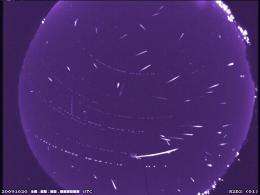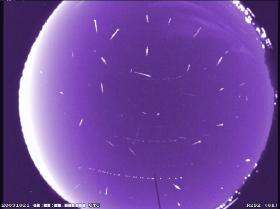Orionids Meteor Shower Lights Up the Sky

Earth is currently passing through a stream of debris from Halley's Comet, lighting up the night sky with the "fireworks" of the annual Orionids meteor shower.
Flakes of comet dust hitting the atmosphere are producing dozens of meteors per hour. Normally this shower gives a modest display of 10 to 20 meteors per hour, but the past few years have been more lively than usual. The Orionids appear around this time each year as Earth orbits through an area of space littered with debris from the ancient comet.
"Earth is passing through a stream of debris from Halley's Comet, the source of the Orionids," says Bill Cooke of NASA's Meteoroid Environment Office. "Flakes of comet dust hitting the atmosphere should give us dozens of meteors per hour."
The best time to look is before sunrise on Wednesday, Oct. 21st. That's when Earth encounters the densest part of Halley's debris stream. Observing is easy: Wake up a few hours before dawn, brew some hot chocolate, go outside and look up. No telescope is required to see Orionids shooting across the sky.
Orionids appear every year around this time when Earth orbits through an area of space littered with debris from the ancient comet. Normally, the shower produces 10 to 20 meteors per hour, a modest display. The past few years, however, have been much better than usual. "Since 2006, the Orionids have been one of the best showers of the year, with counts of 60 or more meteors per hour," says Cooke.

Provided by JPL/NASA (news : web)




















